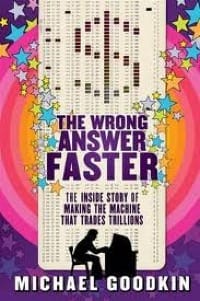New Book Review: "The Wrong Answer Faster"
New book review for The Wrong Answer Faster: The Inside Story of Making the Machine that Trades Trillions, by Michael Goodkin, Wiley, 2012:


Copy provided by Amazon.
A coming of age story of a man and an industry. As a first generation American, a Chicago-area native, and a software professional, I find this memoir entertaining, inspirational, and at times enlightening. The author shares his early struggles as a student in the Chicago public school system that eventually bring success at the university level, and how the lessons learned of his early job experiences feed his later entrepreneurial efforts that result in two successful software companies. At times, Goodkin comes across as a bit unrealistic, perhaps because of what he decides to share, especially since he does leave out a significant portion of his life between these entrepreneurial efforts, but this book is amongst the few memoirs I have read that is also a true page-turner.
While my initial interest in this book was grounded in its presumed tie to software development, it is actually all of the other elements just described that will cause me to talk about it amongst colleagues. After all, it is not until Chapter 4 ("A Big Idea") that Goodkin starts discussing the trading specific ideas that lead to business success, and because the software described is proprietary he does not get into much detail about how it works, beyond sharing at a high level the underlying theories that help the reader understand how the algorithms already available to the public were until that time ignored by Wall Street. Many in the business world are all too familiar with good ideas initially rejected in the workplace, but the manner in which Goodkin walks the reader through his business development efforts is engaging.
In contrast to what some other reviewers have written, the author does admit, however little might be the case, that mistakes were made and how strategies needed to be reassessed and changed throughout the process of building these businesses. For example, he recognized the need to change his marketing approach after his attempts to move the business forward in parallel with a gradually maturing product were failing, and he ties together his previous experiences as founder of Counsel's Aide, a legal service he founded while attending Columbia University, and his failed attempts to interest the City of Chicago, extremely well in Chapter 8 ("Making the Impossible"): "I had once again mistaken a quality service for a marketing strategy. They had no interest in what I was selling because there was nothing in it for them."
"If they made the investment and it didn't pan out, they could lose their jobs. If it did work out, nobody would care. If anything, some of their bureaucratic brethren would be upset with them for having rocked the boat. Last, but certainly not least, nobody ever got a bonus for better performance. In a nutshell, pension fund managers were interested in their pensions." And later in Chapter 9 ("If I Were a Rich Man"), Goodkin remarks that "To my dismay, my sales abilities weren't keeping pace with my enhanced perception. Listening to myself talk, I began to understand why. At university, I had come to the conclusion that professors who used an inordinate amount of technical jargon did so to mask their shallow understanding about what they were talking about. I was no different."
In the Epilogue to this memoir, Goodkin shares the remarkable snowball effects of the efforts of he and the world-renowned professionals on his team: "From 1996 until 2011 the derivatives market grew from an annual $26 trillion to over $600 trillion. Numerix evolved accordingly. No longer solely dependent on accelerated Monte Carlo to provide the wrong answer faster, its product range has grown to include a full line of risk analytics providing the right answer. Indeed, Numerix has developed such a reputation for accuracy that when the supervisors of Lehman Brothers in bankruptcy required an independent appraisal of its massive derivatives portfolio, they turned to Numerix. With over 700 clients in about 25 countries, Numerix has become the global standard in risk analytics."